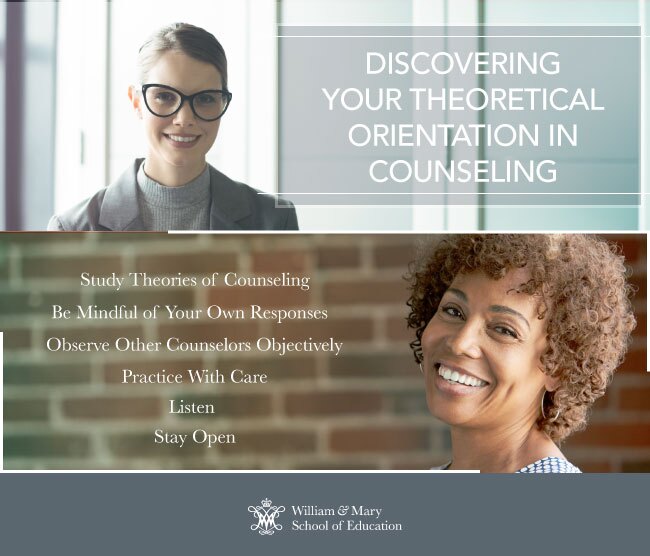If you are pursuing a graduate course of study in counseling, whether your focus is in Clinical Mental Health Counseling, Military and Veterans Counseling or School Counseling, you may have your sights set on increasing your knowledge of practical theory, such as theoretical orientation. Understanding the theories themselves is vital, but understanding and developing your personal theoretical orientation in counseling is just as, if not more, important.
Your entire personality—your past, your skills, your interests, your opinions, the things that make you who you are—will be applied to your work as a helping professional. Understanding the unique fusion of theory, practice, and your point of view that is known as your "theoretical orientation" is essential to becoming a well-rounded and effective counselor.1
Study Theories of Counseling
The history of the psychotherapeutic professions is defined by theories that have been proposed for how best to understand human behavior. And since human behavior is a wide and diverse field of study, so too are psychological theories. Through your course of study, you will be exposed to many of the theories that have shaped contemporary counseling practice. Because of your background, training and other factors that may influence your point of view as a counselor, you may find that you gravitate more strongly to some theories than others.2
Be Mindful of Your Own Responses
Theories of counseling are not right or wrong per se, but it's best to be mindful of your disposition toward the theories you learn. You may find that some seem to suit your understanding of the world as well as your personality. You also might find that some challenge your worldview in a way that feels productive. It may be helpful to keep a log or journal as you study, keeping track of which theories resonate strongly with you. As you do so, you will begin to develop a theoretical orientation framework of your own.3
Observe Other Counselors Objectively
Observing supervisors and peers at work is a crucial component in developing your theoretical orientation in counseling and psychotherapy. Role-playing gives you a chance to put your theories into practice in a safe space, while also providing you with the opportunity to give and receive feedback on your own work as well as the work of others in the same position as a developing counselor. As you experience the points of view and practice of others, continue to be mindful of your responses. You shouldn't choose a theoretical orientation just because it's the choice of your favorite professor or a successful colleague. Keep your biases in check as you explore different types of theoretical orientation.
Practice with Care
Your practicum and internship give you the opportunity to integrate your learning and your practice in a professional setting. Use your hands-on experiences to test, revisit and examine your study in light of actual counseling experiences. Every client is different, and you may find yourself drawing on different theories at different times depending on client needs. As you practice, you will begin to integrate what you have learned and practiced into an actionable theoretical orientation of your own. This integration will continue from your studies to your internship, and to your professional career and beyond.
Listen
Your ultimate goal is to help move your clients away from unnecessary suffering and toward greater self-awareness and overall fulfillment. No matter what your theoretical orientation in counseling is, the center of your attention and practice is the client. For that reason, ask for feedback from your clients. If your approach is not effecting positive change in their lives, it's up to you to determine the best way to move forward with your client's challenges.3
Stay Open
As you study, practice and grow, you will develop your own particular approach through the wide variety of counseling theories. No matter how experienced you become, you should never be content that your way is the right way. Continue to learn and expose yourself to the latest in contemporary theory, and challenge yourself to stay open to the continuing developments in the counseling profession.
Developing your theoretical orientation is a personal journey, but one that will eventually affect your clients own outcomes. Explore the career outlook for clinical mental health counselors, military and veterans counselors and school counselors, and see how the Online M.Ed. in Counseling from William & Mary can help you evolve on your path to a fulfilling profession.
- Retrieved on March 11, 2019, from pdfs.semanticscholar.org/9681/12042d4523b85bf72e5cdae42f523102dd7f.pdf
- Retrieved on March 11, 2019, from betterhelp.com/advice/therapy/how-to-use-theoretical-orientation-in-counseling/
- Retrieved on March 11, 2019, from psychologytoday.com/us/blog/theory-knowledge/201305/my-approach-psychotherapy


